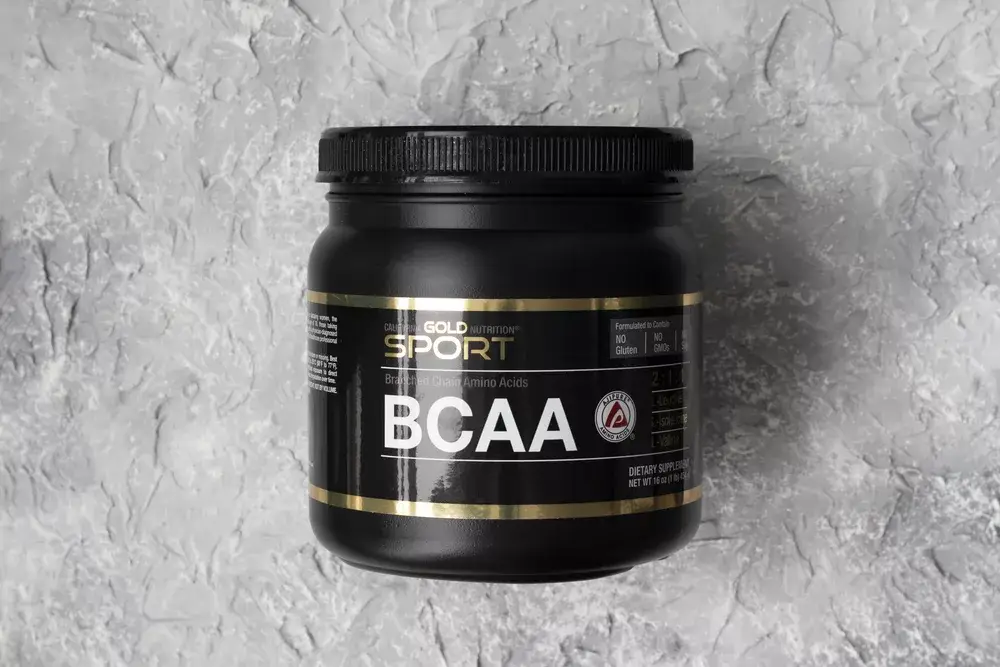Ever hit the gym and pushed yourself to the limit, only to be greeted by days of muscle soreness that slows you down? If you’re a fitness enthusiast or athlete, you’re likely familiar with this struggle. While proper training and a balanced diet are crucial for building muscle and optimizing recovery, some people turn to Branched-Chain Amino Acids (BCAAs) for an extra edge.
But do BCAAs truly live up to the hype? Can they help you recover faster and build more muscle? These are common questions amongst fitness enthusiasts, and the answers might surprise you. In this article, we’ll delve into the science behind BCAAs and muscle recovery, explore the potential benefits (and limitations) of BCAA supplementation, and equip you with the knowledge to decide if they’re a worthwhile addition to your fitness routine.
Along the way, we’ll address your burning questions:
- Do BCAAs actually build muscle?
- Can BCAAs help reduce muscle soreness and speed up recovery?
We’ll separate fact from fiction and provide you with the information you need to make informed decisions about your fitness journey.
Key Takeaways
- BCAAs (Leucine, Isoleucine, Valine) are essential amino acids that might play a role in muscle protein synthesis and recovery after exercise.
- The benefits of BCAAs for muscle recovery are promising, but research is ongoing. Their effectiveness might depend on your overall diet and protein intake.
- BCAAs work best when combined with a healthy diet, proper training, and adequate rest.
- Consult with a healthcare professional before starting any new supplement regimen.

Understanding BCAAs and Muscle Recovery
Understanding BCAAs and Muscle Recovery: Building Blocks and Potential Benefits
Now that we’ve explored the potential of BCAAs to enhance your fitness journey, let’s dive deeper into the science.
What are BCAAs and Why Do They Matter?
Branched-Chain Amino Acids (BCAAs) are a group of three essential amino acids: Leucine, Isoleucine, and Valine. Unlike other amino acids, your body can’t produce them on its own, so you must obtain them through your diet or supplements.
These essential BCAAs play a crucial role in muscle protein synthesis (MPS), the process by which your body builds and repairs muscle tissue. Leucine, in particular, acts as a key regulator of MPS, signaling your body to start building muscle after exercise.
So, how might BCAAs potentially aid muscle recovery?
There are two main theories:
- Increased Muscle Protein Synthesis: As mentioned earlier, BCAAs, particularly Leucine, can stimulate MPS. After a tough workout, your muscles break down to rebuild stronger. By potentially increasing MPS, BCAAs might help your body rebuild muscle tissue faster, leading to quicker recovery [1].
- Reduced Muscle Breakdown: Exercise can also trigger the breakdown of muscle protein. Some studies suggest that BCAAs might help reduce this breakdown, potentially minimizing muscle soreness and speeding up recovery time.
Important to Consider: Limitations and Conflicting Research
While the science behind BCAAs and muscle recovery is promising, it’s important to acknowledge some limitations and conflicting research:
- The impact of BCAAs might be dependent on factors like your overall diet. If you already consume a sufficient amount of protein through your diet, the additional benefit of BCAA supplementation might be minimal.
- Research findings can be mixed. Some studies show positive effects of BCAAs on muscle recovery, while others show little to no significant difference. More research is needed to solidify the specific benefits of BCAAs for various athletes and fitness enthusiasts.
Unveiling the Benefits (if any) of BCAA Supplements: Fact or Fiction?
With the science behind BCAAs and muscle recovery laid out, let’s explore the potential benefits of BCAA supplementation.
Reduced Muscle Soreness:
Muscle soreness, a common experience after intense workouts, can significantly impact performance and training consistency. Some studies suggest that BCAAs might help reduce muscle soreness by potentially minimizing muscle breakdown after exercise. This could lead to a quicker return to the gym and a more consistent training routine.
Improved Muscle Recovery Time:
By potentially stimulating muscle protein synthesis and reducing protein breakdown, BCAAs might contribute to faster muscle recovery after exercise. This could be particularly beneficial for athletes or individuals engaging in high-intensity training programs where recovery time is crucial.
Increased Muscle Protein Synthesis (With a Caveat):
As discussed earlier, Leucine, a key BCAA, acts as a trigger for muscle protein synthesis. Studies suggest that BCAA supplementation might enhance MPS, especially when combined with resistance training. However, it’s important to note that this benefit is most pronounced for individuals who might not be consuming enough protein through their diet. If you’re already getting a sufficient amount of protein from whole food sources, the additional impact of BCAA supplements on MPS might be minimal.
Important Reminder: BCAAs Are Not a Magic Bullet
It’s crucial to remember that BCAAs are not a magic solution for muscle growth and recovery. They work best when combined with a healthy diet rich in protein and a well-structured training program. Getting enough sleep and proper hydration are also essential factors for optimal recovery.
Unveiling the Optimal Timing: When to Take BCAAs for Muscle Growth and Recovery
A critical question for fitness enthusiasts considering BCAA supplementation is: When should I take them for the best results?
The research on the optimal timing of BCAA intake is ongoing, but here’s what we know so far:
Pre-Workout:
Some studies suggest that consuming BCAAs before your workout might be beneficial. The theory is that it can help elevate blood levels of BCAAs, particularly Leucine, which could be readily available to stimulate muscle protein synthesis during exercise. This might be particularly advantageous for fasted workouts or those performed later in the day when your body’s natural BCAA stores are potentially depleted.
Post-Workout:
This is the most widely studied timing for BCAA consumption. The idea is that BCAAs can help kickstart muscle repair and rebuilding processes after a challenging workout by potentially increasing muscle protein synthesis and reducing protein breakdown.
Pre- and Post-Workout:
Combining pre- and post-workout BCAA intake might offer the most comprehensive support for muscle growth and recovery, especially for athletes or individuals engaged in intense training programs. This approach ensures a continuous supply of BCAAs throughout the workout window, potentially maximizing MPS and minimizing muscle breakdown.
Important Considerations:
- The optimal timing might vary depending on your individual goals and training program. More research is needed to definitively determine the best timing strategy for different populations.
- If you’re already consuming a protein shake pre- or post-workout, it likely already contains BCAAs. Whole food sources like meat, poultry, fish, eggs, and dairy products also naturally contain BCAAs.
- Focus on a well-rounded diet and training program. BCAAs should be viewed as a potential supplement, not a replacement for a healthy lifestyle and proper training.

Choosing the Right BCAA Supplement: Navigate the Supplement Aisle with Confidence
Choosing the Right BCAA Supplement: Navigate the Supplement Aisle with Confidence
So, you’ve decided to explore BCAA supplements as part of your fitness routine. But with a vast array of options available, how do you choose the right one? Here are some key factors to consider:
-
BCAA Ratio: The most common BCAA ratio is 2:1:1 (Leucine:Isoleucine:Valine). Leucine is the most crucial BCAA for muscle protein synthesis, so a higher Leucine content might be beneficial. However, the optimal ratio might vary depending on your individual goals and needs.
-
Additional Ingredients: Some BCAA supplements contain additional ingredients like electrolytes, glutamine, or caffeine. Electrolytes can be helpful for replenishing fluids lost through sweat, while glutamine might offer additional recovery benefits. However, these extras are not essential and may increase the cost. Consider your specific needs when evaluating these add-ons.
-
Brand Reputation and Quality Control: Look for reputable brands with a commitment to quality control and third-party testing to ensure the supplement’s purity and potency.
-
Price and Value: BCAA supplements can vary significantly in price. Don’t get swayed by the biggest tub or the flashiest label. Focus on the ingredients, dosage, and brand reputation to get the best value for your money.
Here are some additional tips:
- Read reviews from trusted sources.
- Start with a small tub to see how your body reacts before committing to a larger quantity.
- Consult with a healthcare professional before starting any new supplement, especially if you have any underlying health conditions.
By considering these factors, you can make an informed decision and choose a BCAA supplement that aligns with your goals and budget.
Comparison Table: Top BCAA Supplements (by BCAA Ratio and Key Ingredients)
| Brand Name | BCAA Ratio | Key Ingredients | Highlights |
|---|---|---|---|
| Transparent Labs Bulk BCAAs 5000 Powder | 2:1:1 (Leucine:Isoleucine:Valine) | Just BCAAs | Simple, well-reviewed, focus on BCAAs |
| Optimum Nutrition Essential Amino Acids 1000 Caps | Varied (all BCAAs + additional essential amino acids) | All 9 essential amino acids | Complete package of essential amino acids |
| Scivation Xtend Original BCAA Powder | 2:1:1 (Leucine:Isoleucine:Valine) | BCAAs, Glutamine, Citrulline Malate, Electrolytes | Comprehensive formula with recovery-supportive ingredients |
| Myprotein BCAA Powder | 4:1:1 (Leucine:Isoleucine:Valine) | BCAAs with higher Leucine content | Higher Leucine for potential muscle protein synthesis benefits |
| BulkSupplements.com BCAA 1:2:1 Powder | 1:2:1 (Leucine:Isoleucine:Valine) | Just BCAAs | Affordable, basic BCAA powder |
Please note: This table is not an exhaustive list, and it’s always best to conduct your own research to find the best BCAA supplement for your needs.
Learn about our review process
Top 5 BCAA Supplement Contenders (Based on Research and Reviews): Navigating the Choices
We’ve explored the science behind BCAAs and how they might influence muscle recovery. We’ve also discussed factors to consider when choosing a BCAA supplement. Now, let’s delve into some of the top contenders available on Amazon to help you navigate the selection process. Remember, this is not an exhaustive list, and it’s essential to conduct your own research to find the best fit for your needs.
1. Optimum Nutrition Essential Amino Acids 1000 Caps
- BCAA Ratio: Varied (includes all BCAAs plus additional essential amino acids) at 1 gram per capsule (serving size is 5 capsules)
- Key Ingredients: All nine essential amino acids, including 2.5 grams of BCAAs (Leucine, Isoleucine, Valine) per serving
- Highlights: Optimum Nutrition’s Essential Amino Acid formula provides a complete package of essential amino acids, including BCAAs. This might be beneficial for individuals who want a broader spectrum of amino acid support.
- User Reviews: Positive reviews mention the convenient capsule form and the inclusion of all essential amino acids. Negative reviews mention the high cost per serving compared to pure BCAA powders.
No products found.
2. MuscleTech Amino Build BCAA Amino Acids + Electrolyte Powder
- BCAA Ratio: 2:1:1 (Leucine:Isoleucine:Valine) at 6 grams per serving
- Key Ingredients: BCAAs, Electrolytes, Beta-Alanine, Taurine (for performance)
- Highlights: MuscleTech Amino Build offers a BCAA formula with added electrolytes and other performance-oriented ingredients like beta-alanine and taurine. This might be appealing for athletes seeking a comprehensive pre-workout supplement.
- User Reviews: Positive reviews mention the taste, the variety of flavors, and the inclusion of additional ingredients for performance. Negative reviews mention the artificial flavors and the higher price point compared to some basic BCAA powders.
No products found.
3. Scivation Xtend Original BCAA Powder
- BCAA Ratio: 2:1:1 (Leucine:Isoleucine:Valine) at 7 grams per serving
- Key Ingredients: BCAAs, Glutamine, Citrulline Malate, Electrolyte Blend (for hydration)
- Highlights: Scivation Xtend offers a comprehensive BCAA formula with additional recovery-supportive ingredients like glutamine and citrulline malate. This might be appealing for athletes seeking a more well-rounded supplement.
- User Reviews: Positive reviews mention the wide variety of flavors, the inclusion of additional ingredients, and the mixability of the powder. Negative reviews mention the artificial flavors and the higher price point compared to some basic BCAA powders.
No products found.
4. Nutricost BCAA Powder 2:1:1 (Unflavored, 90 Servings) – Branched Chain Amino Acids
- BCAA Ratio: 2:1:1 (Leucine:Isoleucine:Valine) at 6 grams per serving
- Key Ingredients: Just BCAAs (Leucine, Isoleucine, Valine)
- Highlights: Nutricost offers a simple, unflavored BCAA powder at an affordable price point. This is a good option for users who are looking for a basic BCAA supplement without any additional ingredients or flavors. The high number of servings (90) makes it a cost-effective choice.
- User Reviews: Since Nutricost is a less prominent brand compared to others on this list, there might be fewer user reviews readily available online. However, you can try searching for reviews on bodybuilding forums or independent supplement review websites.
No products found.
Important Note: Be aware that unflavored BCAA powders can be quite bland. If taste is a concern for you, you might want to consider a flavored option from another brand or mix the Nutricost powder with flavored water or a pre-workout drink.
5. BulkSupplements.com BCAA 1:2:1 Powder
- BCAA Ratio: 1:2:1 (Leucine:Isoleucine:Valine) at 5 grams per serving
- Key Ingredients: Just BCAAs (Leucine, Isoleucine, Valine)
- Highlights: BulkSupplements.com offers a very affordable, basic BCAA powder with a 1:2:1 BCAA ratio. This might be a good option for budget-minded users who are only interested in BCAAs.
- User Reviews: Positive reviews mention the excellent price and the purity of the product. Negative reviews mention the bland taste (unflavored) and the need for a separate measuring tool (sold separately).
Remember: This is just a small sampling of the many BCAA supplements available. It’s crucial to consider your individual needs and preferences when making your choice.
No products found.
The Final Verdict: BCAAs for Muscle Recovery – A Recap
BCAAs have emerged as popular supplements amongst fitness enthusiasts, particularly for their potential role in muscle recovery. While research suggests BCAAs might offer some benefits, including reduced muscle soreness and potentially faster recovery times, the evidence is not conclusive.
Here are some key takeaways:
- BCAAs, particularly Leucine, might stimulate muscle protein synthesis, aiding muscle growth and repair after exercise.
- The effectiveness of BCAAs might depend on factors like your overall diet and protein intake. If you’re already consuming a sufficient amount of protein, the additional benefit of BCAA supplements might be minimal.
- BCAAs are not a magic bullet. They work best when combined with a healthy diet rich in protein and a well-structured training program. Getting enough sleep and proper hydration are also crucial for optimal recovery.
The Road to Muscle Recovery is a Multi-Lane Highway
Remember, building muscle and optimizing recovery is a holistic process. While BCAAs might be a potential tool in your belt, they should not overshadow the importance of a well-rounded diet, a proper training program, and adequate rest.
6 FAQs About BCAAs and Muscle Recovery
-
What are BCAAs?
- BCAAs are Branched-Chain Amino Acids, a group of three essential amino acids (Leucine, Isoleucine, Valine) that your body cannot produce on its own and must obtain through diet or supplements.
-
Do BCAAs help with muscle recovery?
- Research suggests BCAAs might help reduce muscle soreness and potentially improve recovery time after exercise. However, the evidence is not conclusive, and their effectiveness might depend on your overall diet.
-
What’s the best time to take BCAAs?
- The optimal timing for BCAA intake is still being studied. Some research suggests pre-workout or post-workout consumption might be beneficial, while others suggest both.
-
Do I need BCAAs if I get enough protein?
- If you’re already consuming a sufficient amount of protein through whole food sources, the additional benefit of BCAA supplements might be minimal.
-
Are there any side effects to taking BCAAs?
- BCAAs are generally safe for most healthy adults when taken at recommended doses. However, potential side effects like nausea, diarrhea, and fatigue have been reported in some cases.
-
Should I consult a healthcare professional before taking BCAAs?
- It’s always recommended to consult with a doctor before starting any new supplement regimen, especially if you have any underlying health conditions.
Consult a Healthcare Professional Before Supplementing
If you’re considering adding BCAA supplements to your routine, it’s always wise to consult with a healthcare professional first. They can help you determine if BCAAs are appropriate for your individual needs and goals.










